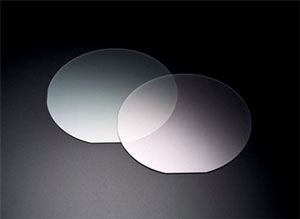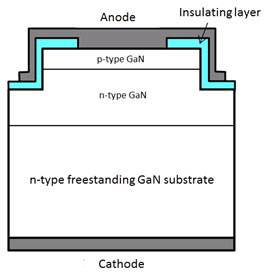- News
4 September 2012
Hitachi Cable demo first GaN vertical diode with 3000V breakdown and 1mΩcm2 on-resistance
 Picture: GaN substrates for power devices. Hitachi Cable Ltd says that it has succeeded in the trial manufacture of what is claimed to be the first gallium nitride (GaN) vertical diode with a high reverse breakdown voltage of 3000V or higher and a low on-resistance of about 1mΩcm2 in the forward direction. The development was achieved through joint research with Toru Nakamura Laboratory in the Research Center for Micro-Nano Technology of Hosei University and the Central Research Laboratory of Hitachi.
Picture: GaN substrates for power devices. Hitachi Cable Ltd says that it has succeeded in the trial manufacture of what is claimed to be the first gallium nitride (GaN) vertical diode with a high reverse breakdown voltage of 3000V or higher and a low on-resistance of about 1mΩcm2 in the forward direction. The development was achieved through joint research with Toru Nakamura Laboratory in the Research Center for Micro-Nano Technology of Hosei University and the Central Research Laboratory of Hitachi.
In recent years, public interest in power devices as a way to conserve energy has been increasing, notes Hitachi Cable. Conventional power semiconductors devices such as diodes and transistors with the ability to convert and control electricity (for applications including consumer electronics in houses, automobiles, railroad vehicles, and power plants) have mainly used silicon. But, to further reduce energy consumption, there has been active development of power devices using materials exceeding the performance limits of silicon.
The new device is a GaN vertical p-n diode with an electrode diameter of 400-800µm in which GaN epitaxial layers are deposited on Hitachi Cable's free-standing GaN substrate by metal-organic vapor phase epitaxy (MOVPE).
 Graphic: Schematic cross-section of sample diode. Due to the void-assisted separation (VAS) method developed by Hitachi Cable, the free-standing GaN substrate used in the sample diode yielded a stable, low-defect dislocation density of 106cm-2. The firm has also confirmed that the dislocation defects in the free-standing GaN substrate are only observed in edge dislocations and mixed dislocations, and that nowhere on the entire surface of the substrate is there a ‘core’ area where dislocation defects are densely located.
Graphic: Schematic cross-section of sample diode. Due to the void-assisted separation (VAS) method developed by Hitachi Cable, the free-standing GaN substrate used in the sample diode yielded a stable, low-defect dislocation density of 106cm-2. The firm has also confirmed that the dislocation defects in the free-standing GaN substrate are only observed in edge dislocations and mixed dislocations, and that nowhere on the entire surface of the substrate is there a ‘core’ area where dislocation defects are densely located.
The voltage resistance test using sample diodes confirmed a high reverse breakdown voltage of 3000V or higher, demonstrating that the dislocation defect in the free-standing GaN substrate is not a killer defect that significantly degrades performances of the power devices. The test also demonstrated that the epitaxial layers grown on the free-standing GaN substrate have a breakdown field that is close to the ideal GaN value (3.3-3.8MV/cm).
The test also indicated that the on-resistance of the diode in the forward direction is about 1mΩcm2, which is smaller than the sum of the resistances at each layer of the diode. This means that conductivity modulation (which lowers the resistance) occurs when an electric current is injected. Conductivity modulation is an effect that can increase the performance of a device beyond its material's inherent performance limits. While it is often used in silicon power devices, it has rarely been seen in compound semiconductors, which have short carrier lifes. In terms of this diode, Hitachi's theoretical analyses suggest that the light generated at a p-n junction is re-absorbed by a diode, and that conductivity modulation (which increases carriers) occurs due to the absorption. In the latest work, Hosei University has experimentally demonstrated the light-emitting properties of diodes.
Hitachi Cable says the findings demonstrate that the free-standing GaN substrate produced by the VAS method can yield power devices with a much higher performance index than with conventional materials such as Si and silicon carbide (SiC). High-efficiency power devices based on this development are expected to reduce the power consumed by equipment and facilities in the future.
Hosei University plans to present the research findings at the 73rd JSAP (Japan Society of Applied Physics) Autumn Meeting 2012 in the Johoku area of Ehime University and the Bunkyo Campus of Matsuyama University (11-14 September).
Hitachi Cable Free-standing GaN substrate GaN vertical diode
